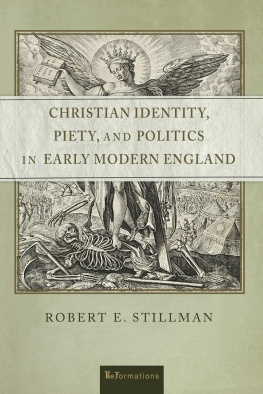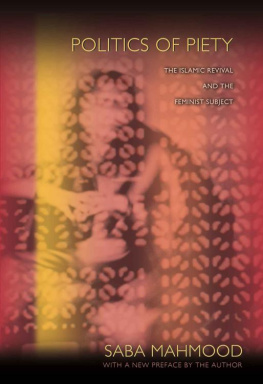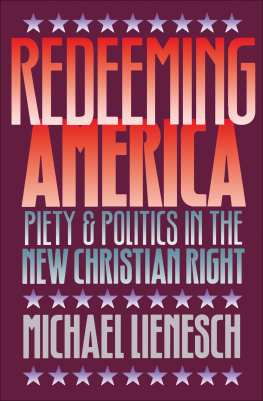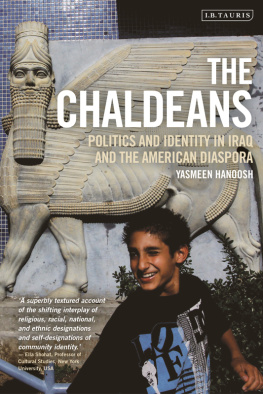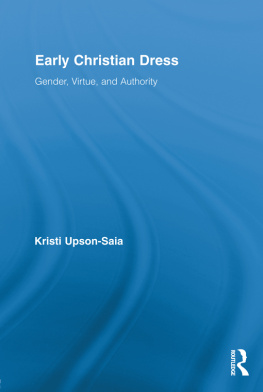Robert E. Stillman - Christian Identity, Piety, and Politics in Early Modern England
Here you can read online Robert E. Stillman - Christian Identity, Piety, and Politics in Early Modern England full text of the book (entire story) in english for free. Download pdf and epub, get meaning, cover and reviews about this ebook. year: 2021, publisher: LightningSource, genre: Religion. Description of the work, (preface) as well as reviews are available. Best literature library LitArk.com created for fans of good reading and offers a wide selection of genres:
Romance novel
Science fiction
Adventure
Detective
Science
History
Home and family
Prose
Art
Politics
Computer
Non-fiction
Religion
Business
Children
Humor
Choose a favorite category and find really read worthwhile books. Enjoy immersion in the world of imagination, feel the emotions of the characters or learn something new for yourself, make an fascinating discovery.
- Book:Christian Identity, Piety, and Politics in Early Modern England
- Author:
- Publisher:LightningSource
- Genre:
- Year:2021
- Rating:5 / 5
- Favourites:Add to favourites
- Your mark:
- 100
- 1
- 2
- 3
- 4
- 5
Christian Identity, Piety, and Politics in Early Modern England: summary, description and annotation
We offer to read an annotation, description, summary or preface (depends on what the author of the book "Christian Identity, Piety, and Politics in Early Modern England" wrote himself). If you haven't found the necessary information about the book — write in the comments, we will try to find it.
Christian Identity, Piety, and Politics in Early Modern England — read online for free the complete book (whole text) full work
Below is the text of the book, divided by pages. System saving the place of the last page read, allows you to conveniently read the book "Christian Identity, Piety, and Politics in Early Modern England" online for free, without having to search again every time where you left off. Put a bookmark, and you can go to the page where you finished reading at any time.
Font size:
Interval:
Bookmark:

Christian Identity, Piety,
and Politics in Early Modern England
ReFormations: Medieval and Early Modern
Series Editors:
David Aers, Sarah Beckwith, and James Simpson
RECENT TITLES IN THE SERIES
The Island Garden: Englands Language of Nation from Gildas to Marvell (2012)
Lynn Staley
Miserere Mei: The Penitential Psalms in Late Medieval and Early Modern England (2012)
Clare Costley Kingoo
The English Martyr from Reformation to Revolution (2012)
Alice Dailey
Transforming Work: Early Modern Pastoral and Late Medieval Poetry (2013)
Katherine C. Little
Writing Faith and Telling Tales: Literature, Politics, and Religion in the Work of Thomas More (2013)
Thomas Betteridge
Unwritten Verities: The Making of Englands Vernacular Legal Culture, 14631549 (2015)
Sebastian Sobecki
Mysticism and Reform, 14001750 (2015)
Sara S. Poor and Nigel Smith, eds.
The Civic Cycles: Artisan Drama and Identity in Premodern England (2015)
Nicole R. Rice and Margaret Aziza Pappano
Tropologies: Ethics and Invention in England, c. 13501600 (2016)
Ryan McDermott
Volitions Face: Personification and the Will in Renaissance Literature (2017)
Andrew Escobedo
Shadow and Substance: Eucharistic Controversy and English Drama across the Reformation Divide (2017)
Jay Zysk
Queen of Heaven: The Assumption and Coronation of the Virgin in Early Modern English Writing (2018)
Lilla Grindlay
Performance and Religion in Early Modern England: Stage, Cathedral, Wagon, Street (2019)
Matthew J. Smith
Theater of the Word: Selfhood in the English Morality Play (2019)
Julie Paulson
Chaucer and Religious Controversies in the Medieval and Modern Eras (2019)
Nancy Bradley Warren
Versions of Election: From Langland and Aquinas to Calvin and Milton (2020)
David Aers
Fifteenth-Century Lives: Writing Sainthood in England (2020)
Karen A. Winstead
Festive Enterprise: The Business of Drama in Medieval and Renaissance England (2020)
Jill P. Ingram
CHRISTIAN IDENTITY,
PIETY, AND POLITICS
IN EARLY
MODERN ENGLAND

ROBERT E. STILLMAN
University of Notre Dame Press
Notre Dame, Indiana
University of Notre Dame Press
Notre Dame, Indiana 46556
Copyright 2021 by the University of Notre Dame
All Rights Reserved
Published in the United States of America
Library of Congress Control Number: 2021941549
ISBN: 978-0-268-20041-1 (Hardback)
ISBN: 978-0-268-20040-4 (WebPDF)
ISBN: 978-0-268-20043-5 (Epub)
This e-Book was converted from the original source file by a third-party vendor. Readers who notice any formatting, textual, or readability issues are encouraged to contact the publisher at
For Sam and Alex and Denise
I do love nothing in the world so much as you
CONTENTS

ACKNOWLEDGMENTS

Some books spring up like mushrooms in the night, and some cycle toward eventual completion like the long quests of Spenserian romance. Humphrey Tonkin first taught me to read Philip Sidney as an international poet, and Roger Kuin to read him against the background of those cosmopolitan humanists who supplied his education in politics and piety, and who taught him how to read and to write books. Learning to understand Philip Sidney among the Philippists excited my curiosity about wider networks of irenically minded Christians seeking the peace of Christendom. In the course of exploring those networks and their potential for illuminating Englands post-Reformation culture, I have been supported mightily by some attentive guides and friends.
Roger Kuin commented on a rough draft of this manuscript, and his probing comments enabled me to understand what this book could become. I have had regular advice from two of my brilliant younger colleagues, Nandra Perry and Timothy Crowley, who gave up time from book projects of their own to help mine. I am grateful for their time and for their unfailingly fine insights. Anne Lake Prescott has helped me to learn how grace presses through the seams of even the most seemingly secular poetry of the early modern era. I have benefited at different stages of composition from the sharp editorial skills and intellectual agility and kindness of Mary Ellen Lamb, as well as from conversations about Renaissance rhetoric with Gavin Alexander; about the Renaissance Aristotle with Micah Lazarus; about scholarly narratives with Christian Gerard; about energeia with Daniel Lochman; about Sidney and Scotland with Arthur Williamson; about Catholic women with Susannah Monta; and about religious identity and the Psalms with Hannibal Hamlin. I am grateful too for the support of David Aers, Sarah Beckwith, and James Simpson, the editors of the University of Notre Dame Presss series ReFormations: Medieval and Early Modern, and for the Presss anonymous readers, who inspired a better book than I first sent them. Last, I want to express my appreciation of the Humanities Center at the University of Tennessee for awarding me a fellowship to pursue my research and writing, and the good conversation it enabled with colleagues like Misty Anderson and Anthony Welch.
Part of Chapter 5 appeared previously as I Am Not I: Philip Sidney and the Energy of Fiction, Sidney Journal 30, no. 1 (2012): 126. I am grateful to the Journal for permission to reprint this material. My manuscript preserves the idiosyncrasies of early modern English print except when they threaten clarity. I have silently transposed u to v, and i to j, and the long () to the lower case s in book titles and citations when comprehension is at stake.
Prologue
THE TORN VESTURE OF SALVATION: CONFESSING WITHOUT NAMES
The Reformation fragmented the once-whole and holy body of Christendom, a locus of spiritual and political unity whose loss was universally lamented, even if that unity had never been fully complete or fully holy.
This is a book about Christians in late Elizabethan and early Jacobean England who espoused forms of piety, who engaged in politics, and who wrote bodies of fiction informed by a wholly different understanding about repairing Christendom and remediating conflict among the divided confessions. These figures were educators, jurists, poets, men of business and courtiers, diplomats and divines, women of consequence and women aspiring to consequence. My book studies their identity as Christians without names and their agency as cultural actors in order to recover their consequence for early modern religious, political, and poetic history. All expressed horror at confessional namesrefusing any name but Christianand puzzled thereby every category that might explain or explain them away. From the vantage of these early moderns, the division among the churches seemed neither irreparable nor self-evidently permanent. It seemed like something altogether more startling.
Division was itself a term that provoked divided responses. Thomas Nashe knew whom to blame for shredding the church (that vesture of salvation) into so many pieces, thereby soiling its partsthe Anabaptists and adulterous Familists and Martinists with a hood with two faces, to hide their hypocrisy; and the barrowists and greenwoodians a garment full of the plague, which is not to be worne before it be new washed. Your If is your only peacemaker, says Shakespeares Touchstone. Ecumenism had its politics, ecclesiastical and otherwise, and the rhetoric of division was regularly co-opted for institutional ends.
Font size:
Interval:
Bookmark:
Similar books «Christian Identity, Piety, and Politics in Early Modern England»
Look at similar books to Christian Identity, Piety, and Politics in Early Modern England. We have selected literature similar in name and meaning in the hope of providing readers with more options to find new, interesting, not yet read works.
Discussion, reviews of the book Christian Identity, Piety, and Politics in Early Modern England and just readers' own opinions. Leave your comments, write what you think about the work, its meaning or the main characters. Specify what exactly you liked and what you didn't like, and why you think so.

